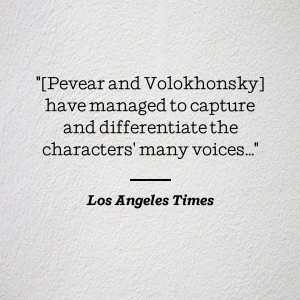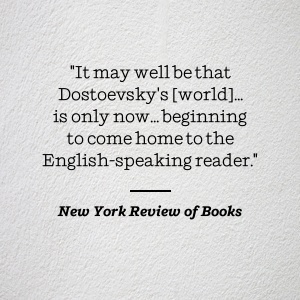Customer Services
Copyright © 2025 Desertcart Holdings Limited


📖 Unlock the underground mind—where classic meets contemporary insight!
Notes from Underground (Vintage Classics) is a seminal work by Fyodor Dostoevsky, translated by Richard Pevear and Larissa Volokhonsky. This edition ranks in the top 1000 books overall and is a top contender in psychological and classic literature categories, boasting a 4.6-star rating from over 2,800 readers. A must-have for those craving profound literary and philosophical exploration.



| Best Sellers Rank | #980 in Books ( See Top 100 in Books ) #45 in Psychological Fiction (Books) #71 in Classic Literature & Fiction #186 in Literary Fiction (Books) |
| Customer Reviews | 4.6 out of 5 stars 2,834 Reviews |
A**R
A classic.
absolutely loved this book. Might be my fave Dostoevsky one I've read so far. My husband and I refer to it all the time. We are all the man from the underground, and we should all strive to be better.
C**E
Shipped with no damage
Great book. Paper back in great condition.
A**R
Interesting Novel, Smudge Mark
Wonderful book, of course not the easiest read but it’s Dostoevsky, come on now. Good quality. Took off a star because it did come with a smudge mark on the cover.
M**N
The man who couldn't become even an insect
My first encounter with Notes From the Underground was in college, when I wasn't doing well psychologically. I saw a lot of myself in the Underground Man, who is never properly named in this bleak novel. It's difficult to say what the Underground Man's chief problem is. He's neurotic, a little narcissistic, a little vain, a little cowardly, stuck in his ways, and so aware of his flaws that he's filled with self-loathing. Yet, at the same time, he has people he looks down upon, such as Apollon, those he sees as his equals, such as Liza for a bit, and those above him, whom he despises. Unable to live a more, say, *heroic* real life, he's become bookish, imagining a world and life that cannot be, leading him to humiliate himself at every turn. His neuroses and vanity have prevented him from connecting with others. His bookishness gets him into trouble again and again. Instead of taking responsibility for all of this, the Underground Man assumes that he's better than others (while also insisting, perhaps a little unconvincingly, that he's trash), has a more developed consciousness, that of course people want to make themselves miserable if that means they have a choice, etc. Notes From Underground follows the narrator through a dinner party and a illicit winter visit to a millner's at night. He also details his head-in-the-cloud dreams of duels, of honor, of being the hero, being lauded, and as he does, it becomes obvious why something as prosaic as a dinner party or a visit with a lady of the night would be such major events in his forty years of life. Coming back to this book almost twenty years (making me almost the same age as the narrator) after I first read it was a weird experience. It's been more than a few years since I was anywhere near the headspace, though at times I still sense glimmers of it. For those who see themselves in the narrator, Notes From the Underground is a warning against vanity, narcissism, and protecting your ego by sticking your head in the clouds. For everyone else, it's a view into someone beaten down by their own flaws (and no doubt helped there by poverty), unable to take responsibility, unable to change, and unable to *really* be honest with himself. The translation is pretty good. It needed a lot more paragraphs, but the story gets across just fine.
J**R
The first half is the result of the second
Near the end, after so much madness and insanity, Dostoevsky breaks above it for a moment and gives a beautiful, insightful, precious description of a father, mother and child: "The first married love will pass, true, but then an even better love will come. Then their souls will grow close; they'll decide all their doings together; they’ll have no secrets from each other. And when children arrive, then all of it, even the hardest times, will look like happiness; one need only love and have courage. Now even work brings joy, now even if you must occasionally deny yourself bread for the children's sake, still there is joy. For they will love you for it later; so you're laying aside for yourself. The children are growing - you feel you're an example to them, a support for them; that even when you die, they’ll bear your thoughts and feelings upon themselves as they received them from you, they'll take on your image and likeness. So it is a great duty. How can a father and mother fail to grow closer? People say it's hard having children. Who says so? It's a heavenly happiness! Do you love little children, Liza? I love them terribly. You know - there's this rosy little boy sucking at your breast, now what husband's heart could turn against his wife, looking at her sitting with his child! The baby is rosy, plump, pampered, sprawling; his little hands and feet are pudgy, his nails are so clean and small, so small it's funny to see; his eyes seem to understand everything already. He's sucking and clutching at your breast with his little hand, The father comes up - he'll tear himself away from the breast, bend back, look at his father, laughing - as if it really were God knows how funny - and then again, again start sucking. Or else he’ll up and bite his mother’s breast, if he’s already cutting teeth, while giving her a sidelong look: ‘See how I bit you!’ Isn’t this the whole of happiness, when they’re all three together, husband, wife, and child? A lot can be forgiven for those moments. No, Liza, one must first learn how to live, and only then accuse others!"
E**C
Good read
Excellent 2 part book. Finished in about a week
B**B
An Underground Scrooge without redemptive Christmas ghosts
I re-read Notes from Underground after re-reading Invisible Man because Ralph Ellison, in his introduction to the 30th anniversary edition of that novel, mentioned the influence of the Dostoevsky novella. The structure is similar, in that it is the present day ruminations of a person driven into isolation for various reasons recalling the events of 15-20 years earlier that led to his current state. Ellison's novel is one of a series of works that fall under the shadow of the Underground Man and his ramblings and ravings. He compares himself to an insect and I detect an influence on Kafka's metaphor turned literal transformation in "The Metamorphosis"; his isolated anti-hero tries to rescue a prostitute as Travis Bickle in Martin Scorsese's film Taxi Driver would do over a century later. While the Underground Man merely talks of liberation and realizes even as he says it that it is mere lip service to vague notions, Travis carries his crusade into overt, destructive action. I will not cover ground that dozens of critics before me have trod--Dostoevsky's parody of the `rational egoism of philosopher Chernyshevsky, specifically his utopian novel What is to Be Done? or the movement of radical socialism with which Dostoevsky parted ways after his prison sentence to Siberia. All of Dostoevsky's works reflect the issues and philosophical/social movements of the Russia of his time and many have commented extensively on how those movements made their way into his stories and novels. If Dostoevsky were merely a chronicler of his time I don't think he would have exerted such a powerful influence on philosophers and literary artists of subsequent generations or that his works would still be in print via fresh translations such as Richard Pevear's and Larissa Volokonsky's acclaimed works. Dostoevsky was writing of the Russia of his time and yet his depiction and dissection of human nature is universally relevant to the present day. In Notes from Underground the nameless Underground Man is an anti-hero of sorts or has been taken as one and he has also been interpreted as an exaggerated fictional counterpart to Dostoevsky himself. While he shares many of his creator's characteristics I do not think Dostoevsky ever intended this character to be a model to aspire to for anyone although the character is a mouthpiece for what Dostoevsky considered valid criticisms of his society. Like Dickens' Ebenezer Scrooge, the Underground Man has become bitter and cold-hearted and has retreated from the warmth of human companionship. However, whereas Scrooge's journey could be summarized as youthful idealism corrupted by love of the acquisition of material wealth to the exclusion of human relationships redeemed by spiritual, godly intervention, the Underground Man was only slightly less bitter in his youth and now his inheritance has given him the opportunity to retire and retreat from even the minimal human contact that an occupation would require of him. There are no benevolent spirits ready to administer tough love on the Underground Man. He is rooted in his rut and will probably never emerge from it. Sixteen years earlier, he briefly yielded to compassionate impulses as he urged a prostitute named Liza to leave her life of degradation. After his inevitable humiliation and the collapse of his fortress of egoism, Liza did reach out to him with unselfish concern. He could not accept unconditional compassion and retreated into his current misanthropic state. Dostoevsky's depiction of the Underground Man is more than simply a matter of opening or closing the heart. The Underground Man, like Hamlet, is very intelligent. Like Hamlet, he also overanalyzes. In fact, his intelligence and his overactive mind is his undoing more than anything else. He thinks himself into a state of misery. He possesses warring, contradictory impulses that most of us possess. Whereas most of us temper and censor these thought, the Underground Man's mind and imagination run rampant. He is self-analytical and at one point says that underground men such as him should be tethered. Everything that he accuses others of doing he does in multiples. He criticizes others for being cowardly and yet by retreating to his hovel he is the ultimate coward. Perhaps his bravest act is in writing these `notes' where he is relentlessly ruthless in his honesty, to the extent that he can be honest with himself. He is not only the forerunner of Dostoevsky's series of conflicted protagonists but also provides a template for many of the anti-heroes of literature for the next century and a half.
M**D
Book came dirty
book came dirty, but the book itself is in good condition.
Trustpilot
1 month ago
1 month ago
2 months ago
3 weeks ago